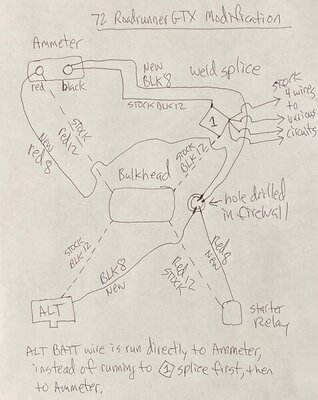Yes, 4 gauge wiring recommended with 80 amp fuse.
Maybe it would be better to run a second battery with a separate charge wire from the alternator?
woah!!!!... LOL... That's a diff stuff... just like hook up a second starter motor!!!
Yes, 4 gauge wiring recommended with 80 amp fuse.
Maybe it would be better to run a second battery with a separate charge wire from the alternator?
woah!!!!... LOL... That's a diff stuff... just like hook up a second starter motor!!!
This could make a diff story about the ammeter setup. And I guess you will be using a capacitor
well, if all the power comes from the same alt, both should be recharged, so both should be hooked up somehow to the ammeter. And with engine off, if you put max volume, pretty sure you ammeter could read max discharge or close.
( Damn! I'm still thinking on what you have in mind to need an amplifier requiring a 4 gauge wire and 80 fuse LOL ).
I'm a sound tech, and the amplifiers used use to suck, 15-20 amps... sure at 110-120 Volts which makes of course difference
well, if all the power comes from the same alt, both should be recharged, so both should be hooked up somehow to the ammeter. And with engine off, if you put max volume, pretty sure you ammeter could read max discharge or close.
( Damn! I'm still thinking on what you have in mind to need an amplifier requiring a 4 gauge wire and 80 fuse LOL ).
I'm a sound tech, and the amplifiers used use to suck, 15-20 amps... sure at 110-120 Volts which makes of course difference
So if the primary battery doesn't get discharged, even with the engine off and at max volume then the ammeter shouldn't show a discharge.
The function of a battery Isolator is to charge two separate battery systems from one alternator. Would want the isolator to be current rated to at least the rating of the max alternator output. Marine stores were a good source for quality isolators when I was doing this work professionally, quite a while ago.
No discharge current would flow to the other system but both batteries would receive charge current. No current flow in the second system would register on the ammeter.
All audio components power would need to be sourced from the second system only, can’t have any loads split between the two systems through audio connections. Use a relay to isolate the key on signal to the head unit or audio accessories needing a key signal.
Now the battery isolator must just split the current from the alternator?
More accurately, the primary/car system’s voltage regulator has no control over any of the charge rates. Simply it maintains a given voltage level based on the car’s ignition 1 (blue wire) in the engine harness. With an isolator, any loads, from either system, to the alternator output lowers the line voltage as seen by the car’s system. The regulator then brings up the rotor field winding current until the output line voltage returns to normal. Regulator has no idea what or where the output current load is going.The primary side voltage regulator is controlling the charging rate.

